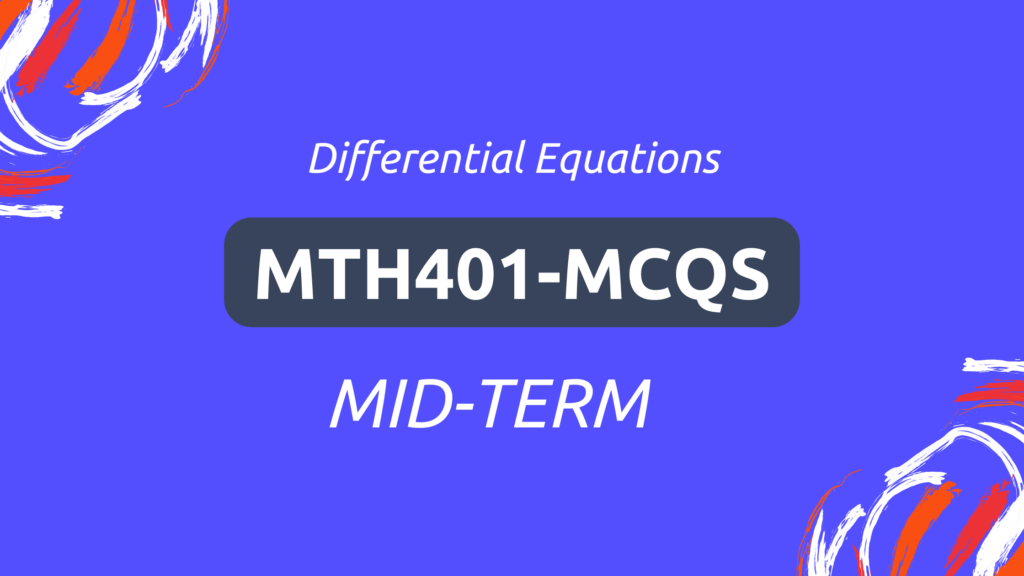1. Which of the following would be a general solution of the differential equaion: dy/dx = 4?
- y = 4x+a
- y = ax+4
- y = 4x+4
- y = ax+a
2. The order of the differential equation: d²y/dx²+5(dy/dx)³-3y = esin x is___.
- 0
- 1
- 2
- 3
3. ydx-y(sin x)dy = 0, is an example of ___ differential equation.
- Exact
- Non-Exact
- Non-linear
- Non-homogeneous
4. Which of the following substituton will transform the differential equation: dy/dx = (x+y+1)/(x+2y+1), in to separable form?
- y = v+x
- y = vx
- x = vy
- x = X+h, y = Y+k
5. For the non-exact differential equation ydx-(y-3x-3)dy = 0, if (∂N/∂x-∂M/∂y)/M = 2/y, then the integrating factor is:
- -1/y²
- 1/y²
- -y²
- y²
6. For f(x,y) = x²y-xy²,f(tx,ty) =…
- f(x,y)
- tf(x,y)
- t²f(x,y)
- t³f(x,y)
7. Which of the following is first order linear equation in unknown variable y?
- x(dy/dx)+(sin x)y = cos x
- y(dx/dy)+(sin y)x = cos y
- y(dx/dy)+(sin y)x = cos x
- y(dx/dy)+(sin x)x = cos y
8. Which of the following is the integrating factor for the 1st order linear differential equation: x(dy/dx)+y = f(x)
- ex
- lnx
- x
- 1/x
9. Which of the following are explicit solutions of the differential equation: dy/dx = -x/y
- y = ±√(4+x)
- y = ±√(-4+x²)
- y = ±√(4-x²)
- y = ±√(-4-x²)
10. A differential euation M(x,y)dx+N(x,y)dy = 0 is exact if there exists a multi-variable function (x,y) such that ___
- df(x,y) = (∂f/∂x)dx+(∂f/∂y)dy
- ∫f(x,y)dx = ∫(∂f/∂x)dx+∫(∂f/∂y)dy
- f(x,y) = (∂f/∂x)dx+(∂f/∂y)dy
- f(x,y) = ∫(∂f/∂x)dx+∫(∂f/∂y)dy
11. The differential equation dx/dy+(1/y)x=2siny is first order linear in unknown___
- variable x
- variable y
- multi-variables x and y
- dy/dx
12. If the non-exact differntial equation M(x,y)dx+N(x,y)dy = 0 is homogeneous and xM(x,y)+yN(x,y) ≠ 0, then the integrating factor is:
- (∂N/∂x-∂M/∂y)/M
- (∂M/∂y-∂N/∂x)/N
- 1/(xM-yN), xM-yN ≠ 0
- 1/(xM+yN), xM+yN ≠ 0
13. The integrating factor for the first order linear differential equation: dy/dx+y cot x = sin² x is
- sin x
- cos x
- e sin x
- e cos x
14. Which of the following is an example of Homogeneous function?
- f(x,y) = sin (1/x)
- f(x,y) = sin (x/y)
- f(x,y) = sin x
- f(x,y) = sin xy
15. Which ofthe following would be a constantsolution of the separable differential equation: dy/dx = cos x sin y?
- x = nπ,n∈ℤ
- x = 2nπ,n∈ℤ
- y = nπ,n∈ℤ
- y = (n+1/2)π,n∈ℤ




